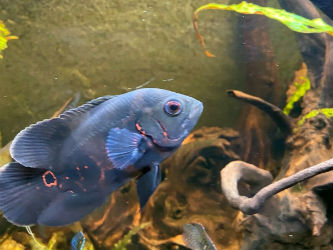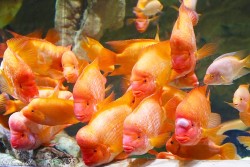Oscar fish breeding behavior and the signs of prespawning activity

Oscars, or velvet Cichlids, have long fascinated both the advanced and novice fish keeper. They are arguably the most intelligent fish and they have astonishing personality. Oscars can be trained to do tricks, to recognize their owner, and even allow themselves to be petted. However, they do have one major drawback: their adult size. Oscars easily grow to 12", with some specimens reaching 18"! This makes a tank of 55 gallons necessary for a single adult, and 75-90 gallons for two adults. Most hobbyists do not wish to to dedicate this much space to one or fish, but anyone who has been enchanted by that genuine oscar charm gladly invests his money and time into caring for his fish.
Oscar fish and Water Conditions
Being native to the Amazon Basin, oscars prefer water with a low pH (6.0 - 6.5) and a higher temperature (78 - 84 degrees F). Their idea tank would be 125+ gallons with peat-filtered blackwater, but oscars are adaptable and can adjust to a wide range of pH values and temperatures; some will even spawn at a pH of 8.0! All things considered, stable water conditions are more important than the "correct" water conditions.
Oscar fish and Decorating the Tank
Due to their large size and destructive nature, anything used in the tank, from the thermometer to filter intakes to driftwood, must be sturdy. This limits your choice of decorations for the tank considerably. Although some people keep plants with their oscars, there are no plants in the oscar's natural habitat (only roots) and they have a tendency to destroy them. If you really want plants, it is a good idea to try plastic ones first to see how your oscars react. Some will leave the plants completely alone while others will methodically uproot and destroy them. Some good alternatives for decoration are driftwood, roots, aquarium safe rocks, and slate (spawning oscars need a piece of slate regardless of whatever else you use in the tank).
Oscar fish and Feeding
Oscars are ravenous eaters and will generally eat anything that goes into their tank, including any other fish small enough to fit in their mouths. Oscars are easy to feed compared to some other large cichlids; basically any table scraps that are not heavily spiced can be tossed into their tank for their dinner. This includes almost any meats, cheeses, greens or grains that you can think of. Some oscars will readily accept all foods while others are picky and will only eat a particular kind of food. If you do not wish to make your own meals for your oscars, there are several varieties of pellet and frozen foods available at your local pet store that will be fine for them. Some people give their oscars feeder fish (comets, rosy reds, or guppies being the most common kinds). I would advise against this unless you know the source of the feeders very well because this is one of the easiest ways to introduce disease into your tank, and some people even think that feeders increases aggression. Contrary to popular belief, oscars can and will digest fats. Their natural diet of live fish is high in fat, and almost any commercially prepared food will contain some amount of fat.
Oscar fish and Breeding
This is considered quite a feat. Oscars are impossible to sex unless you observe them spawning, and as a rule any male will not mate with any female. Also, oscars will "test" each other before the spawning and if one partner does not pass the test, he or she will probably end up dead. The best way to spawn is to raise 7 - 10 babies together in a large tank (150g+). Make sure you have something to do with the oscars once you have a breeding pair because the male of the pair will make life very hard on any tankmates and may even kill them. Once you have a true breeding pair, spawning commences as often as once a month. The eggs are deposited on a piece of slate or on a cleared off space on the aquarium floor. If your oscars eat the eggs or spawn, remove the eggs to a a holding tank, but be sure that you have a current going over them. If you leave the eggs in with the adults, they will protect them fiercely and will occasionally mouth them to clean them. If you are going to attempt to breed oscars, be sure you read up on them and know what you are getting into!

 Oscars, or velvet Cichlids, have long fascinated both the advanced and novice fish keeper. They are arguably the most intelligent fish and they have astonishing personality. Oscars can be trained to do tricks, to recognize their owner, and even allow themselves to be petted. However, they do have one major drawback: their adult size. Oscars easily grow to 12", with some specimens reaching 18"! This makes a tank of 55 gallons necessary for a single adult, and 75-90 gallons for two adults. Most hobbyists do not wish to to dedicate this much space to one or fish, but anyone who has been enchanted by that genuine oscar charm gladly invests his money and time into caring for his fish.
Oscars, or velvet Cichlids, have long fascinated both the advanced and novice fish keeper. They are arguably the most intelligent fish and they have astonishing personality. Oscars can be trained to do tricks, to recognize their owner, and even allow themselves to be petted. However, they do have one major drawback: their adult size. Oscars easily grow to 12", with some specimens reaching 18"! This makes a tank of 55 gallons necessary for a single adult, and 75-90 gallons for two adults. Most hobbyists do not wish to to dedicate this much space to one or fish, but anyone who has been enchanted by that genuine oscar charm gladly invests his money and time into caring for his fish.






